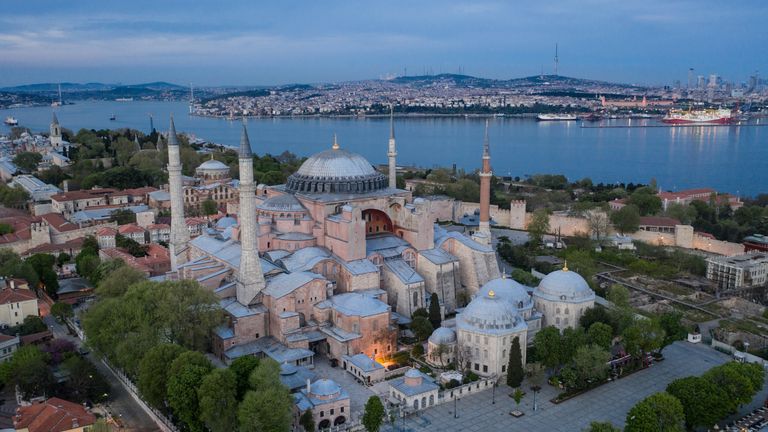Hagia Sophia: Row over ancient Turkish monument 'a test for the country's future'
The 1,400-year-old building has previously been a cathedral and a mosque, but currently acts as a museum.
Wednesday 1 July 2020 14:03, UK
A court battle over the use of an ancient building in Turkey is being seen as a test of the future direction of the country, an analyst says.
The use of the 1,400-year-old Hagia Sophia in Istanbul, which has been a cathedral, a mosque and is now a museum, is being reviewed by Turkey's highest court, after a request to convert it back into an Islamic place of worship.
However, there are groups that believe that the Unesco World Heritage Site should remain as a museum, to show Istanbul's place in the world and prevent it becoming a divisive building.
The group pressing for the structure to be returned into a mosque is seeking to overturn a decision from 1934 by the council of ministers, led by Turkey's secularist leader Mustafa Kemal Ataturk, which led to the Hagia Sophia becoming a museum.
President Recep Tayyip Erdogan, leader of a conservative Islamic party, has previously voiced support for turning the building back into a mosque - seen as an effort to consolidate his voter base.
It is believed by western analysts that Mr Erdogan blames secularism - the separation of state and religion - for problems in his country and wants to use the Hagia Sofia to move attention away from economic issues.
Soner Cagaptay, Turkey analyst for the Washington Institute, said: "This is not just a debate about a building. Ataturk established Hagia Sophia as a museum to underline his vision of secularising Turkey.
"(Erdogan) feels the pressure of popular support dwindling and therefore he wants to use issues that he hopes will re-mobilise his right-wing base around nativist, populist, anti-elitist topics."
He added that the Hagia Sophia issue would likely have a "temporary impact in keeping Erdogan's base with him".
"(But) if he does not deliver economic growth, I can't see him winning elections as he did in the past."
To Islamist groups, the structure is seen as a symbol of Ottoman Sultan Mehmet the Conqueror, and these groups have objected to the building's use as a museum.
In recent years, the government has allowed Koran readings inside the building, with Mr Erdogan reciting prayers there. This year, he oversaw a recital of the "prayer of conquest" at the site over video call.
On Tuesday, Istanbul-based Ecumenical Patriarch Bartholomew I, considered the spiritual leader of the world's Orthodox Christians, said that the Hagia Sophia had been a Christian place of worship for 900 years, and one for Muslims for 500 years.
:: Listen to the The World Tomorrow on Apple podcasts, Spotify, and Spreaker
He added: "As a museum, Hagia Sophia can function as a place and symbol of encounter, dialogue and peaceful coexistence of peoples and cultures, mutual understand and solidarity between Christianity and Islam.
"The potential conversion of Hagia Sophia into a mosque will turn millions of Christians across the world against Islam."
Greek foreign minister, Nikos Dendias, has also weighed in, warning President Erdogan against the changes and saying it will "deeply hurt Turkey".
According to local media, the building could remain open to tourists should it be turned back in to a mosque, with reports that it could be converted as soon as 15 July - a national holiday that marks four years since an attempted coup.




